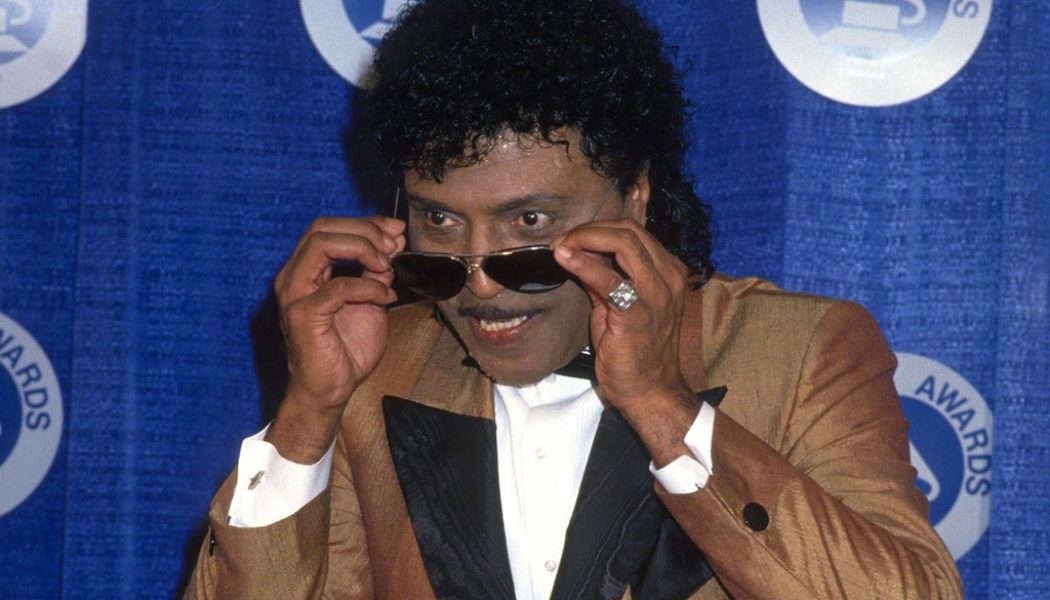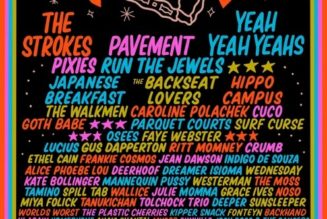
Richard’s tone was genial and good-natured, but you can bet that it reflected a genuine sense that his role as a rock’n’roll pioneer had been under-appreciated.
Little Richard never won a Grammy in competition, but he provided one of the most memorable moments at the 30th annual Grammy Awards, held on March 2, 1988 at Radio City Music Hall in New York.
That was a strong Grammy show to begin with. It was the year Michael Jackson gave one of the most captivating performances in Grammy history, and U2 won album of the year for the first time.
Little Richard and David Johansen, former leader of the New York Dolls (who recorded solo as Buster Poindexter), walked onstage to present the award for best new artist. Richard pointed out that Johansen’s hair was styled in a pompadour nearly identical to one that Richard had made famous in the ’50s. “I used to wear my hair like that. They take everything I get — they take it from me.”
That led into a hilarious, if also somewhat cutting, bit playing on the fact that Richard had not gotten his due at the Grammys and other award shows. The routine began when Richard held the envelope and said, “And the best new artist is — me!”
[embedded content]
As the audience laughed, he said, “I have never received nothing. Y’all ain’t never gave me no Grammy and I been singing for years. I am the architect of rock ‘n’ roll and they never gave me nothing. And I am the originator!” By now, the audience was on its feet, showing Richard the respect he had not formally gotten from the academy. Richard returned to the envelope and said “and the winner is…still me!”
And there was this: “Being a brown Jew from Georgia, I had to tell the truth.”
Richard’s tone was genial and good-natured, but you can bet that it reflected a genuine sense on his part that his role as a rock’n’roll pioneer had been under-appreciated.
After Richard left the stage, Billy Crystal, who was hosting for the second year in a row, mined the bit, particularly the line “being a brown Jew from Georgia.” Crystal joked that Richard would be releasing new versions of his old hits– “Long Tall Shirley,” “Good Golly Miss Molly Goldberg” and “Tutti Frutti, So Sue Me.”
There are two main reasons that Richard never won a Grammy — and, in fact, was never even nominated. First and most importantly, many of his classic hits (including “Tutti-Frutti” and “Long Tall Sally”) were released before the 1958 inception of the Grammy Awards. Second, the Grammys had little appreciation for rock ‘n’ roll in their first decade of existence. Richard’s 1958 hit “Good Golly, Miss Molly” was eligible at the first Grammy Awards, but the voters of that era were more into easy-listening trifles like Domenico Modugno‘s “Nel Blu Di Pinto Di Blu (Volare),” which won record and song of the year that first year.
The Grammys have sought to make amends to Richard — and other early rock ‘n’ roll artists who they shunned. Richard received a lifetime achievement award from the Recording Academy in 1993. Four of his recordings have been voted into the Grammy Hall of Fame — “Tutti-Frutti,” “Long Tall Sally,” “Lucille” and the 1957 greatest hits album Here’s Little Richard.
There are two post-scripts to this story. When Richard finally announced the best new artist winner it was Jody Watley, who had had a big pop/R&B crossover hit in 1987 with “Looking For a New Love.” She won despite the fact that she had previously received a Grammy nomination as a member of the popular trio Shalamar. Today, an earlier nomination would disqualify an artist in this category.
And Crystal did such a good job as Grammy host, he was asked back the following year as well — before he moved on to an even bigger awards show stage. He would ultimately host the Oscars nine times.









